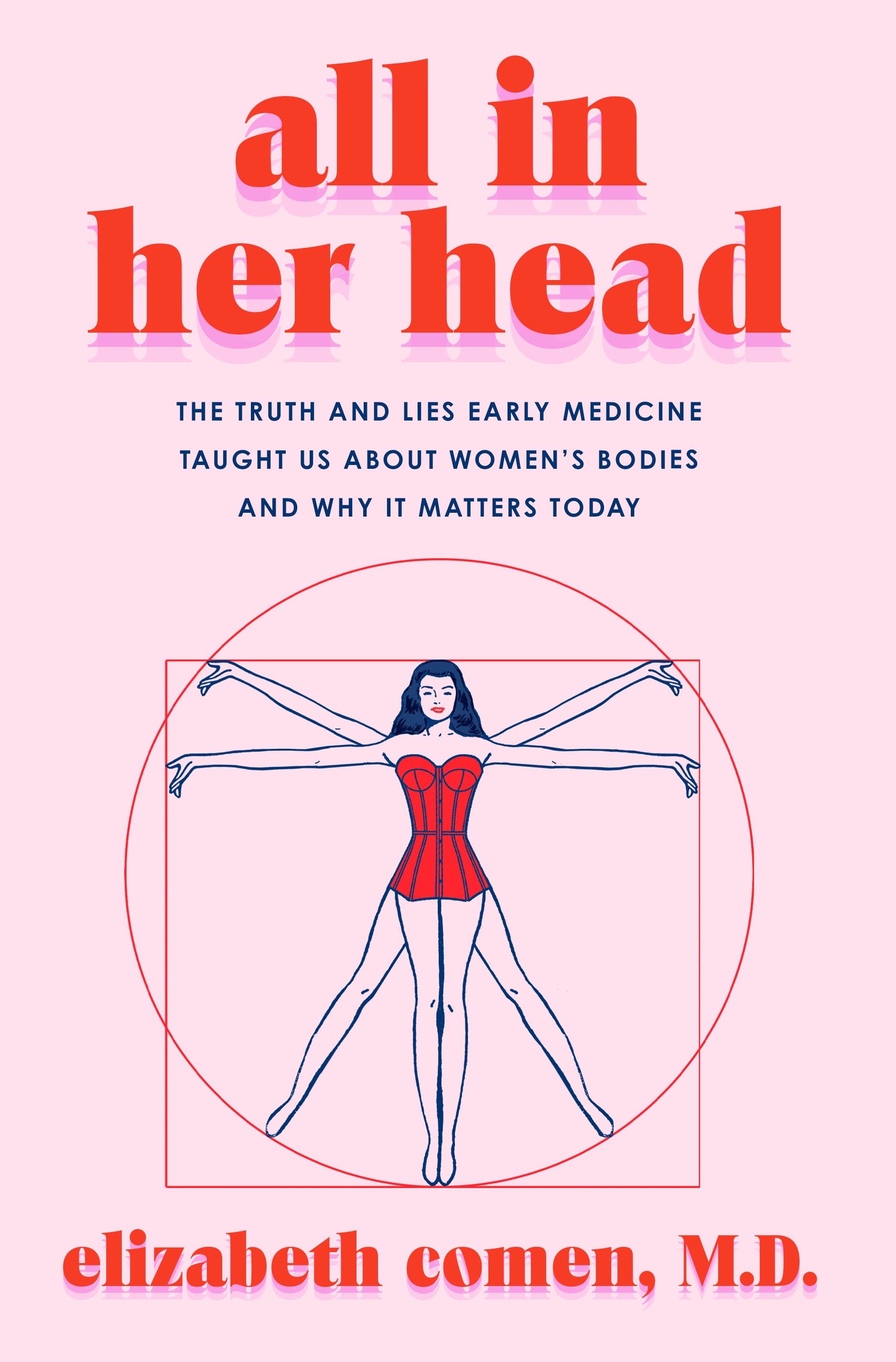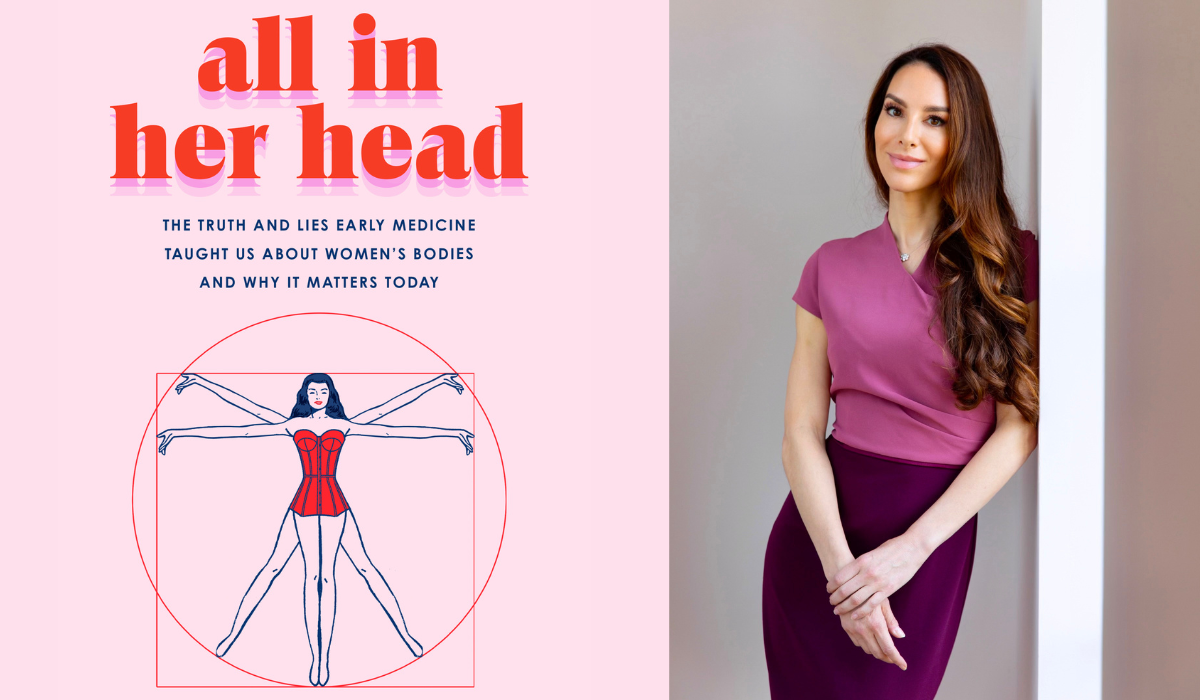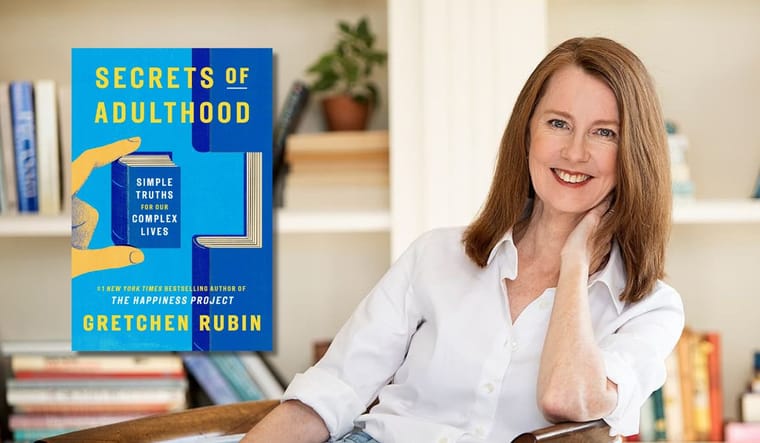Dr. Elizabeth Comen Breaks Down Healthcare’s Shameful History of Ignoring Women—And Tells Us What We Can Do About It
Elizabeth Comen, MD, walked into her patient’s room on the breast cancer ward of Memorial Sloan Kettering hospital. For six years, Dr. Comen had helped this patient, Ellen, live with an incurable breast cancer that had spread to her lungs and bones. When it was time to say goodbye, all Dr. Comen could think about was how brave Ellen had been—and how she wished she could’ve given her more time.
As Dr. Comen leaned in for a hug, Ellen said: “I’m so sorry for sweating on you.”
“Ellen wasn’t the first or the last patient to say these words to me,” writes Dr. Comen in her book, All in Her Head. “The emotion I encounter most in the examination room, more potent and insidious than fear, is shame.”
So many women, in particular, feel this shame and urge to apologize for our bodies. And one of the reasons, says Dr. Comen, is that for as long as medicine has been a practice, women’s bodies have been ignored, idealized, shamed, and dismissed.
The Sunday Paper sat down with Dr. Comen to learn more about the frustrating, eye-opening history of women’s health she discovered while researching and writing her bestselling book, and what she wants all of us to know about how to advocate for our health despite the societal stigmas and lingering ignorance that still shape our relationship with our bodies and the healthcare system.
A CONVERSATION WITH ELIZABETH COMEN, MD
Your new book is titled All In Her Head, which is a phrase a lot of women can relate to when it comes to being dismissed for our health concerns. Why do you think we’re still getting the medical brush-off?
I think there’s a long legacy that we desperately need to unpack in order to move forward.
It is a legacy of the hysterical woman. The anxious housewife. The lobotomized woman. The fact that we have been part of a system that was built around largely male doctors caring for female patients, some of whom may have had incredible intentions.
We’ve been understudied, underfunded, and dismissed. When doctors don’t know what they’re talking about, it’s easier to say, You know what, it’s all in your head. You’re just anxious. You’ll be fine. You’re hormonal. Unfortunately, the title of the book strikes a tremendous chord.
It’s complicated, because we should be able to trust our gut and trust our own instincts about our bodies. But I think when there is this inherited blame and shame that so many of us imbibed from culture, history, society, and religion, it’s tempting to wonder, Well, do I even believe myself? Do I even trust my body when the rest of the world may not validate what I’m saying and what I’m thinking? It’s a very complicated dynamic.
You start the book with the powerful story of Ellen who apologized to you for sweating as she was dying. You end your book with your own story about a moment you said to an emergency room nurse, “I’m so sorry, I forgot to wear deodorant.” Why do we do this?
The way I start the book was a bit controversial—some thought it was too much of a Debbie Downer. But I was adamant about telling that story because I wanted the world to know just the type of apologizing that I see. As an oncologist, I am privy to these stories—heartbreaking moments where these are not the apologies that women should be giving on their deathbed.
Then, after I’d finished writing this book about advocating for yourself, I had my own medical emergency. And when it came to my own advocacy, I didn’t trust my gut. I let multiple doctors tell me what was wrong with me when both my instinct and medical knowledge told me it was something else. When I was in extraordinary pain, I still had the urge to say, I’m so sorry I didn’t put on deodorant. I’m so sorry for bothering you.
Much of what happens in medicine and our experience with our bodies mirrors a cultural and historical narrative about women. It’s not just in medicine that we apologize excessively. So why are we surprised that when it comes to our bodies—which have been shamed in many ways—do we feel the need to apologize for not showing up perfectly coifed or manicured or pedicured or waxed, even when we are sick or in pain?
So what do we do about this—if not for ourselves, then to set an example for our daughters and granddaughters?
I think there’s this reductionist view that medicine and science is about biology and genes and DNA. All that stuff is incredibly powerful. That’s how we cure disease and find new treatments. But our experience of illness is about the stories we tell each other about our bodies. It’s the stories we tell ourselves. It’s the stories we pass on. It’s the stories we inherit.
The more we recognize this, the more we can change how we narrate the experience of illness for ourselves and for those around us.
Hormones are still so misunderstood, and you argue that the female endocrine system is rooted in a narrative that women’s hormones make us crazy or foolish or emotional. What’s it going to take for this to change?
I believe it’ll change when the scientific and medical landscape changes. In one respect, especially in the menopausal space, you see this groundswell of attitude change—like, women are not dead when they go through menopause! And yet, so much of the historical narrative about women’s bodies and women’s health is focused on puberty and reproductive fitness.
I believe this mirrors the aging woman and how she’s still treated with less value in society. But I think the more we can understand the biology of what happens to women over our lifecycle from a hormonal standpoint and the more we talk about it, we begin to bring that power back to what it means to be a woman—no matter how old we are or what our hormones are doing or what lifecycle we’re in.
What do you think is the best way for women to start ditching the shame we have about our bodies? How do we start to speak the unfiltered truth, especially to our healthcare providers?
Shame does not get us anywhere. It doesn’t empower us. It doesn’t help us understand our bodies better. It is an albatross that hangs over every way we can experience health and joy in this world.
At some point we all have to take a little bit of a risk, shed the shame, ask the questions that we want to ask, and see the better health we can get by doing these things.

Elizabeth Comen, MD, is a medical historian, oncologist at Memorial Sloan Kettering Cancer Center, and assistant professor of medicine at Weill Cornell Medical College.
Please note that we may receive affiliate commissions from the sales of linked products.



